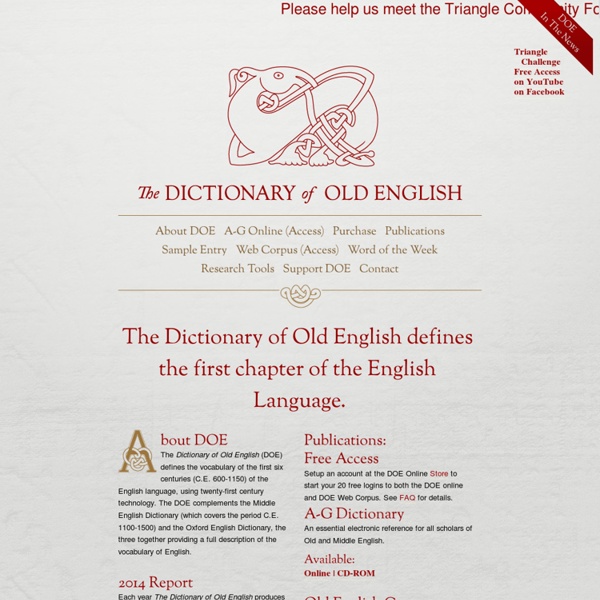



Home page for Business English Dictionary This is an exciting new monolingual dictionary of 35,000 business-related words, phrases and meanings designed to be used by business students and anyone using or encountering English in their work. Select "Business English" from the list of dictionaries at the top of any page on Cambridge Dictionaries Online to search this dictionary. Favourite Entries Key Features English Dictionary The English dictionary is based on WordNet 1.7.1 (Copyright © 2001 by Princeton University. All rights reserved). It contains around 150 thousand terms with examples, synonyms, antonyms, and related words.
Oxford Dictionary of Word Origins "A treasure (from the Greek ‘thesauros’, treasure, store or storehouse) trove (past participle of an Anglo-Norman verb meaning ‘to find’) of verbal wonders" – William Hartston, Daily Express Combining both accessibility and authority, The Oxford Dictionary of Word Origins describes the origins and development of over 3,000 words and phrases in the English language. The book draws on Oxford's unrivalled dictionary research programme and language monitoring, and relates the fascinating stories behind many of our most curious terms and expressions in order to offer the reader a much more explicit account than can be found in a general English dictionary. Organized A-Z, the entries include first known use along with examples that illustrate the many faces of the particular word or phrase, from ‘handsome’ to ‘bachelor’ and ‘cute’ to ‘baby’, from ‘pagan’ to ‘palaver’ and ‘toff’ to ‘torpedo’.
Pathfinders This guide is designed for anyone who is looking for the origin of words and/or phrases, also called etymology (these terms will be used interchangeably in this pathfinder). Both print-based and Web-based sources are included. Internet Sources | Searching for Etymology | Print Resources The Best Free Dictionary and Thesaurus Programs and Websites Are you a writer? Or a word geek? If you write anything or play word games, dictionaries, thesauruses, and other reference tools can come in handy.
Stanford Parser Stanford Parser Please enter a sentence to be parsed: My dog also likes eating sausage. Language: Sample Sentence American Marketing Association Dictionary Whether you're looking for an obscure phrase or your basic marketing definition, the AMA Dictionary has it all! Originating from the print version in 1995, we're always adding new terms to keep marketers up to date in the ever-evolving marketing profession. Browse terms related to - A. OneLook Reverse Dictionary <div id="needs_javascript"><center><b>Note: The new Reverse Dictionary requires JavaScript.</b><br /><img src="/img/a.gif?q=omg_a_user_without_js"> If you have disabled JavaScript in your browser, please <a href=" it for this site</a> or use the <a href="/?w=entersearchhere&loc=revfp_legacy">old version of the reverse dictionary</a> here.</p><p></center><div>
Online Native American Picture Dictionaries (American Indian Animals) American Indian languages American Indian tribes What's new on our site today! Here are the picture dictionaries of we have completed so far (illustrated Native American animal words from more than a hundred different languages.)